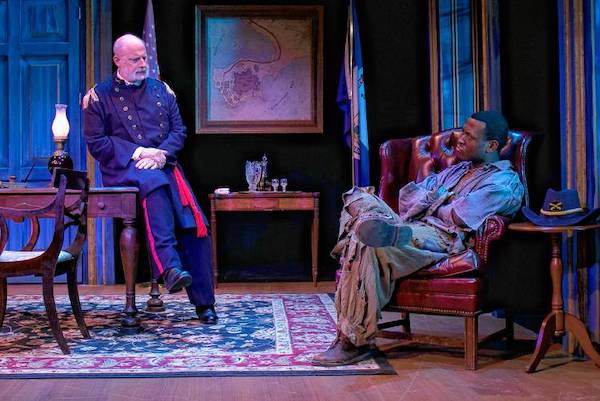Theater Review: “Ben Butler” — A Verbally Dexterous Comedy About Serious Business
By Jim Kates
This production brings the Peterborough Players back in line with their own best traditions: entertaining, thoughtful, delightfully irreverent.
Ben Butler by Richard Strand. Directed by Gus Kaikkonen. Staged by Peterborough Players, 55 Hadley Road, Peterborough, New Hampshire, through August 11.

Douglas Rees as Ben Butler and London Carlisle as Shepard Mallory in the Peterborough Players production of Ben Butler. Photo: courtesy of Peterborough Players
The tribulations of a regional theater company in these degenerate days are many. There is far more competition at home (streaming, etc.) than there used to be. Epidemics and gas prices shut down venues and discourage pilgrims.
The venerable Peterborough Players in New Hampshire have not been immune. They used to be relatively highbrow — early seasons in the ’30s showcased works by classic playwrights such as Goldsmith, Molière, and Wilde, along with more contemporary fare like Edna St. Vincent Millay’s Aria da Capo and Robert Sherwood’s Petrified Forest. Serious drama mixed with lighter entertainment. Into the 21st century, the company’s most produced playwright was George Bernard Shaw.
Even before the forced closure of the 2020 season things were changing. Single-person biographical shows or two-handers were more frequent than before. There was a turn away from “serious” fare. (It may be a superficial index, but the last Bernard Shaw production was The Doctor’s Dilemma in 2017; the last Shakespeare — if we don’t count a stunningly brilliant one-man recitation of The Rape of Lucrece — played in 2011.)
Recently, the urgency of box-office appeal, combined with internal struggles about artistic direction, has drained most of the vitality from the Peterborough Players. Only this season, with a last-minute return of the earlier artistic director Charles Morey and other stalwarts of the repertory company, have things been looking up.
Still, let’s not forget the box office. Morey, reminiscing with me about a thoughtful 1987 production of a controversial and powerful South African play, sighed, “But the seats were empty.”
This season has brought us a competently exuberant Noises Off!, Ira Levin’s clever Death Trap, an adaptation of Jane Austen’s Pride and Prejudice for the stage, and, to finish off, there will be Man of La Mancha. Hardly cutting edge. Wading-pool deep.
But, for now, there’s Richard Strand’s 2016 play Ben Butler, the only really interesting offering of the season. This production, directed by the veteran Gus Kaikkonen, brings the Players back in line with their own best traditions: entertaining, thoughtful, delightfully irreverent. There’s even a strong touch of Shavian paradox in the script.
The historical General Benjamin Butler was Napoleon’s size and often accused of having Napoleon’s ego. In Confederate and Lost Cause demonology, he is remembered as the abolitionist “butcher” who governed New Orleans for the Union during the Civil War. In reality, his life was far more ambiguous. Early in his military career, when three Black conscripts sought refuge from their Confederate enslavement, Butler defined them not as fugitive slaves but as “contraband.” That meant they were under his protection as confiscated war matériel, a paradoxical policy that first embarrassed and ultimately altered Lincoln’s prosecution of the Civil War.
This is the underlying premise of Strand’s script. It plays fast and loose with the history without ever letting go of it. It is serious business written as verbally dexterous comedy.
Sitting uneasily in his command at Fort Monroe, Virginia, newly minted Major General Butler (Douglas Rees) tries to come to terms with an articulate and determined man, Shepard Mallory (London Carlisle,) who has run away from his servitude in the nearby Confederate fortifications.
Although Butler was only 43 years old in real life, Rees plays him as a bit of a blustering Colonel Blimp maybe 20 years older, thereby bringing out the inner Butler — an uncomfortable mixture of irascibility and benevolence — more convincingly than a shorter, younger actor might have. Rees maintains a sharp contrast with the boyish, clever, code-switching Carlisle, whose presence creates and represents the dilemma posed by his classification as “contraband.” The script does not resolve these complications (we learn very little of Mallory’s backstory). It is a testament of Carlisle’s skill that he turns the abstractions of his character (and the argument he embodies) into not only a credible individual, but an engaging one.
The imbalance between our understanding of General Butler as he is written and the sketchiness of Mallory’s character could prove problematic if we thought about it too much in racial terms. But the play is Ben Butler, and the direction and skill of both principal actors in this production slide us over any discomfort.
Nicholas Wilder makes a superb straight man as Lieutenant Kelly, whose humanity and growth add emotional weight to the verbal fencing between the protagonists. Kurt Zischke, who comes onstage blindfolded (for good military reasons) in a sly parody of a Ku Kux Klan hood, stolidly stands for the Confederate cause.
J. Kates is a poet, feature journalist and reviewer, literary translator, and the president and co-director of Zephyr Press, a nonprofit press that focuses on contemporary works in translation from Russia, Eastern Europe, and Asia. His latest book of poetry is Places of Permanent Shade (Accents Publishing) and his newest translation is Sixty Years Selected Poems: 1957-2017, the works of the Russian poet Mikhail Yeryomin.
Tagged: Ben Butler, Douglas Rees, Gus Kaikkonen, London Carlisle, Peterborough Players, civil-war
